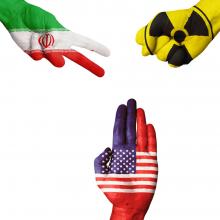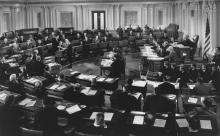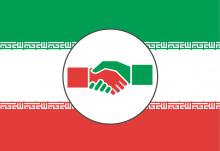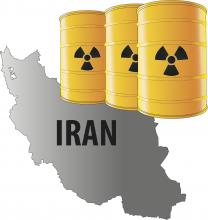Yousef Bashir's remarkable story of reconciliation.
Peace and Nonviolence
Moriel Rothman speaks candidly about his decision to not serve in the Israel Defense Forces.

(Editor's Note: This post was adapted from the author's speech at the Christianity 21 Conference in Denver.)
When I was in seminary, one of my best friends came up with a brilliant theological … pick up line:
"Hey, baby. What’s your hermeneutic?"
Despite the genius of that question, we soon discovered that anytime you start a pick up line with “Hey, baby” you’re in some trouble.
But it’s such a great question. Think of all the relationships that would have avoided painful break ups if they just defined the relationship in the beginning by answering the question “What’s your hermeneutic?"

“Belief is as hard as a hickory nut
that cracked holds many mansions.”
—Pat Schneider
If my belief were a hickory nut
I’d keep it safe in my pocket
easy to find with fumbling fingers.
When challenged
I’d take it out
say here, see this.
This is what I believe.

THE ULTIMATE BRAVERY might well be the courage to forgive one’s enemies and hold on to hope.
Nelson Mandela famously emerged from 27 years in prison as a reconciler and uniter, somehow free from bitterness and hatred. He was able to put into practice Jesus’ call to love our enemies—and thus became the father of the new South Africa.
Far from the upper echelons of power and fame, forgiving our enemies can be a difficult task, since “enemies,” by their very definition, aren’t easy to love. But in places of oppression, occupation, and routine violence, it’s even harder.
Take, for example, the story of a young man named Yousef Bashir. He grew up in the Gaza Strip, near an Israeli settlement known as Kfar Darom. In 2000, Palestinians rose up in protest against the Israeli occupation in what became known as the Second Intifada. In response, Israeli soldiers came to Yousef’s house and told his family to leave.
His father had dedicated his life to teaching Yousef and his brothers “how to coexist with the Israelis,” Yousef explained over lunch in Philadelphia early this winter, and he insisted on staying in their long-time family home. As a result, Yousef said, Israeli soldiers moved into the Bashir family’s house when he was 11 years old. They occupied the house until he was 15.
What a relief it would be to dwell in [faith] communities where we acknowledge our shadows in a healthy acceptance of ourselves as containers of all the opposites! It may prove beneficial to be forced to face, daily, the humiliating fact that some of us are no less violent than those whose policies we oppose.
—Walter Wink, Engaging the Powers
I AM A conscientious objector, and I am drawn to violence. My attraction to violence is both innate and learned. When something frightens me, my hands clench into fists. When something angers me, I want to inflict pain upon that thing. But a person cannot inflict pain upon a thing, so I seek out those whom I deem responsible for said thing and my desire to inflict pain upon a thing morphs into a desire to do violence to another person. Since I was a child, I have fantasized about using violence to stop what I see as bad and thereby become good.
It is from this point—from these fantasies of righteous violence—that I begin this essay on my journey to principled nonviolence and conscientious objection. This is a story of change and choice, but it is not a story of transformation: I am who I have always been.
In fall 2012, I spent three weeks in Israeli military prison for refusing to enlist in the Israel Defense Forces. (Every Israeli citizen, except for the ultra-Orthodox and Palestinian citizens of Israel, must serve in the military.) My sentence was brief, but the process that brought me to the prison’s gates took almost a decade.

MARIE-LOUISE IS a 34-year-old single mother of three living in Bujumbura, the capital of the southeast African nation of Burundi. When she was 15 years old, she joined a rebel movement during the civil war in her country. “Following my demobilization,” she said, “my family welcomed me back warmly, but my neighbors did not think much of me. I still go around with a firearm ... Even my old friends find it hard to trust me. I have been branded because I am a female ex-combatant.”
Around the world, several armed conflicts are showing signs of winding down, at long last—there is renewed hope that the M23 rebel group in the Democratic Republic of Congo will stop fighting; the government and the FARC rebels in Colombia are making progress in negotiations toward peace after 65 years of civil war; the Philippine government and the Moro Islamic Liberation Front have agreed on a pact to end the fighting.
These events bring into focus the tremendous challenge of reintegrating former combatants into society. The process is especially difficult when they have been forced to commit atrocities against their own people. Think of Guatemala, Sierra Leone, and Cambodia, to name just a few.
The unique characteristics of each conflict make generalizations difficult, but in the stabilization and peace-building process, attention must be given to a complex of transitional justice issues, such as truth-telling and accountability for human rights violations. Other important factors include disarmament, the reintegration and rehabilitation of former combatants, security sector reform, economic justice and jobs, gender equality, the impact of the armed conflict on children (including child soldiers), and the political context.

I have followed, with great interest, as my friend, Ian Ebright, ran a successful Kickstarter campaign for, and then completed, his short film on American drones called “From the Sky.” It’s a sensitive and nuanced treatment of those on the receiving en of our hi-tech military aggression.
This, combined with all I’ve read at Sojourners and in Time magazine, among other places about these low-risk (to us), high-efficiency (for us) killing machines, helped solidify in my mind a fairly resolute sentiment: Drones are bad.
And then I read, with great interest, my most recent issue of Popular Science, which details the physics and engineering behind these new insect-size drone bots, which replicated insect flight for the first time in the machine world. These highly nimble and portable gadgets are already being used for everything from reconnaissance and recovery on disaster sites to pollinating crops in areas where the indigenous bee population has been decimated.
So, of course, these exciting new breakthroughs left me with only one resolute sentiment: Drones are awesome!
Joshua Casteel served as an interrogator in Iraq. Then an encounter with a Jihadist challenged him to truly live out his faith.

Bio: Sister Jean Lait, CSF, is an Anglican Franciscan sister based in San Francisco who protests drones and their effects on children. communitystfrancis.org
1. Why did you decide to stand up against drones?
During WWII, I experienced the bombing of Coventry in England. As a child of 9 years, I slept under the stairs, anxiously waiting for the bombs to drop. Toward the end of the war, flying bombs known as “doodlebugs” were used. These were very similar to drones and were sent from Germany. They were aimed anywhere. These were bombs where you heard a whistle and then it was silent before the bang.
Thinking back on the fear and anxiety I experienced, the whole idea of drone warfare is just immoral to me. No child should ever be that frightened. No child should have to live in a war zone. That kind of trauma affects you, one way or another. You either use that experience for good or otherwise.

AS THE U.S. prepares to officially (but not completely) pull out its military from Afghanistan by the end of 2014, some wonder whether it all was a waste. More than a decade of war has cost tens of thousands of lives and hundreds of billions of dollars. But the balance sheet of “lessons learned” shows some less-depressing calculations.
In the last several years, U.S. generals have repeatedly told Congress and the U.S. public that “there is no military solution” to the war in Afghanistan. This marks a significant shift in military thinking. In the early 2000s, the boastful, overconfident views that wars in Afghanistan and Iraq would be quick and easy outnumbered more cautious and skeptical military voices. If nothing else, more military leaders today are forthrightly speaking out against the fantasy of firepower solutions to complex political problems.
The U.S. and its Western allies are also learning a related lesson: The lack of legitimate governance is a fundamental cause of much of the world’s violence. Afghanistan’s political leaders who opposed the Taliban became de facto Western allies, even though many had ruled by force and racked up their own long list of human rights abuses. In the rush to set up a new government to replace the Taliban, the West propped up corrupt and tyrannical warlords as provincial governors, dooming hopes for an Afghan democracy and authentic leaders with popular support.
Counterinsurgency projects attempted to pull support from the Taliban and other insurgents by winning Afghan hearts and minds so they would trust their government. But Western military forces learned that free handouts of Western aid money could not fundamentally change the corrupt nature of the Afghan government or its public image.
LATELY I’VE been reading my dead friend’s files. That’s how I know that he often typed in Cambria. That’s how I know that he drafted beginning-to-end, reworking early paragraphs before he set down the next—which is why so much of his writing just stops. That’s how I know that as a child he held press conferences in a White House made of cardboard boxes, wearing a clip-on tie, and that the night before he began school at West Point (a school he’d soon leave), he and his father smoked cigars on a hill overlooking the Hudson River, though his father did not like cigars. That’s how I know how much he thought about pain, which to Heidegger is “the rift,” a “separating that gathers,” and to Wittgenstein is “a having, not a knowing,” and to Elaine Scarry is an “objectless experience” that “destroys language.”
This thinking was for classes at the University of Iowa and the University of Chicago, and this thinking was for other people, namely prisoners and fellow soldiers in the War on Terror, which was also the Global War on Terrorism, and was the Iraq War and is still the War in Northwest Pakistan and the War in Afghanistan, a subset of which is “Operation Enduring Freedom,” and is also and continues to be World War III or World War IV, depending on how you count, and was once The War Against Al-Qaeda and is now the Overseas Contingency Operation, which has been tidily renamed CVE (Countering Violent Extremism).
Joshua Casteel was sent to the Long War after first enlisting in the Army Reserves as a high school junior in Cedar Rapids, Iowa. Seven years later he was stationed at Abu Ghraib prison as an interrogator and linguist. This is where he became convicted that he could no longer be an “American war fighter,” which he saw as treason against his “real kingdom and home.”

Iranians tend to trust religion far more than they do politics. Accordingly, it could be helpful to formulate a potentially helpful Track Two initiative around Iran’s openness to religion as a precursor to discussing important secular issues. One possibility that comes to mind, especially if the current negotiations lead to further openness, is what one might call a “peace game.” Since Iran has been the focus of any number of war games, this would represent a peacemaking counterpart. However, rather than a scenario-driven exercise as most war games tend to be, a peace game would be more akin to facilitated brainstorming.
The basic concept would call for bringing participants from Iran and the United States together for a week to discuss what the Iranians proposed earlier, i.e. how to overcome the obstacles that stand in the way of a cooperative relationship. Participants for the game would be chosen from the ranks of respected religious, political, academic, and professional figures who (1) are not in government, (2) are known to be spiritually minded, and (3) have views that would command serious consideration by their respective governments. A religious framework for the discussions would be established at the outset, a world-class expert on negotiations would facilitate the “game,” and the final recommendations would be presented to both governments for appropriate consideration.

After a decades-long standoff, Iran and the West (plus China and Russia) have signed an interim agreement to halt Iran’s nuclear program in exchange for modest sanctions relief. While some are calling it a historic breakthrough along the lines of Nixon’s visit to China, the U.S. media has been mostly skeptical. And in a rare display of bipartisanship, Congress is already looking for ways to derail the deal by passing legislation to impose new sanctions on Iran and tie the President’s hands for future negotiations. Despite the fact that President Obama has successfully passed tougher sanctions on Iran than any previous administration, the U.S. media in lockstep with Congress continue to thumb their noses at anything that resembles diplomacy when it comes to Iran. And while other U.S. allies in the region — primarily the Gulf States led by Saudi Arabia — have expressed their concerns over this deal, few Americans care about what the Saudis think. As representatives of the American people, what Congress really cares about is what Israel thinks.
That’s where things get dicey.

The nuclear deal that the U.S. just struck with Iran is nothing short of historic. This agreement is a victory for everyone who wants to prevent a nuclear-armed Iran and a catastrophic war.
The deal is one of the many triumphs that have resulted from the great American tradition of negotiating with adversaries to advance U.S. interests. President Kennedy's talks with Premier Khrushchev delivered the world from the brink of nuclear war. Ten years later, President Nixon's visit to Mao's China revolutionized the U.S. role in Asia, and the world. A decade later, President Reagan's diplomatic engagement of President Gorbachev achieved historic nuclear arms reductions.
UN weapons inspectors are now on track to peacefully disarm Syria of its chemical weapons because Washington was willing to engage the Syrian regime through diplomacy with Moscow, rather than through Tomahawk cruise missiles. And under the deal reached in Geneva this weekend, Iran will stop advancing its nuclear program for the first time in nearly a decade.
Iran's nuclear program will now be under an expanded inspections regime to help ensure that Iran's nuclear program is used for purely peaceful purposes. In exchange, Iran will receive modest sanctions relief.
Make no mistake: this is a good deal, and it should be protected so that our diplomats have the space to negotiate a final agreement to prevent war and a nuclear-armed Iran once and for all.

The nuclear agreement with Iran is a triumph of diplomacy. It stops the expansion of Iran’s nuclear program, rolls back some of its most worrisome elements, establishes more rigorous monitoring to guard against cheating, and suspends some sanctions on the Iranian people.
If implemented, this agreement will significantly reduce the potential nuclear threat from Iran and enhance the security of Israel and other states in the region. Secretary of State John Kerry and President Barack Obama deserve credit for supporting the diplomatic effort.
The agreement includes a commitment from the U.S. and its allies to “not impose new nuclear-related sanctions for six months.” This means that the U.S. Senate must defer any further sanctions measures to allow compliance to proceed.
A choral piece dedicated to “all who grieve and in memory of the children and adults of Sandy Hook Elementary School.”

World War I hostilities ceased at 11 a.m. on the 11th day of the 11th month, Armistice Day, 1918. Dubbed “The war to end all wars,” World War I closed with a commitment to peace. A year later, President Woodrow Wilson proclaimed Nov. 11, 1919, the first commemoration of Armistice Day, a day for America “to show her sympathy with peace and justice in the councils of the nations.”
When, in 1926, the U. S. Congress officially recognized the commemoration, it proclaimed, “the recurring anniversary of this date should be commemorated with thanksgiving and prayer and exercises designed to perpetuate peace through good will and mutual understanding between nations.” Armistice Day became a legal holiday in 1938, as a day dedicated to the cause of world peace.
In a culture of war and empire, it’s time to reclaim Nov. 11 as a day of peace.